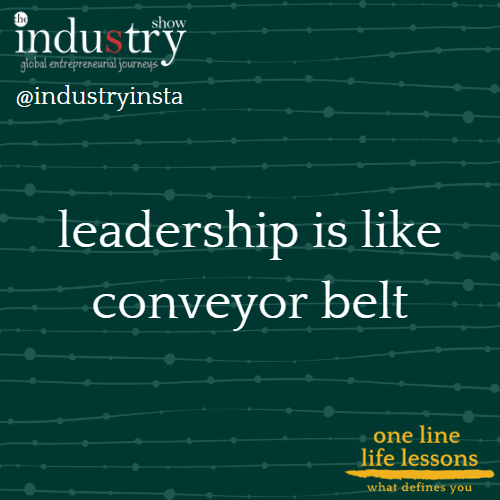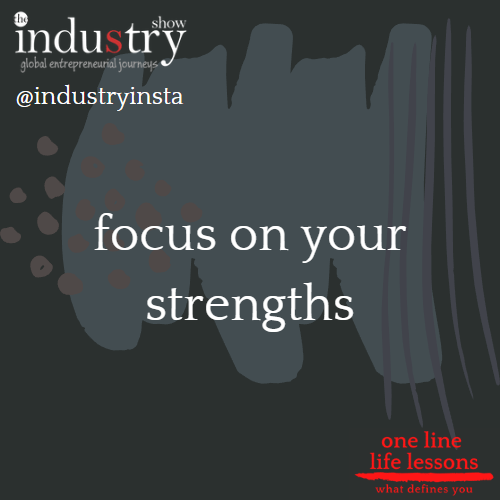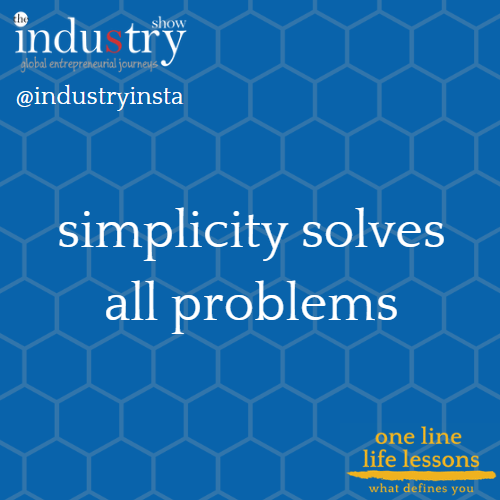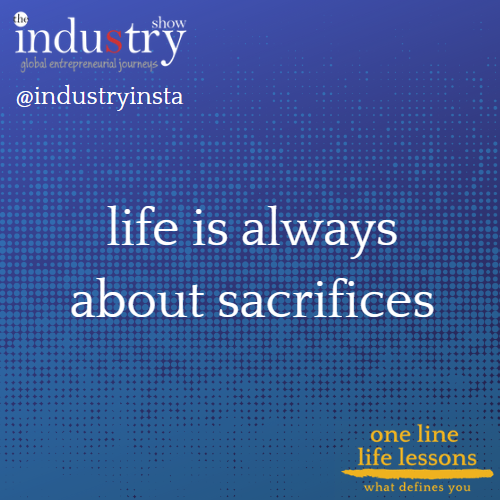Nov 20, 2022
Jordan Schindler
Jordan Schindler is the founder and CEO of Nufabrx, a company that creates fabrics infused with active ingredients to provide health and wellness benefits. Jordan’s entrepreneurial journey began with a passion for innovation and a desire to solve everyday problems. He shares his experience in developing Nufabrx, highlighting the challenges and successes along the way. Jordan’s dedication to creating impactful products and his commitment to sustainability are central themes in his work. Through Nufabrx, he aims to revolutionize the textile industry and improve people’s lives.
One Line Life Lessons from Jordan





Episode Highlights
- (0:00:00) – Nitin Bajaj welcomes Jordan Schindler to the show
- (0:00:12) – Jordan Schindler is the quintessential entrepreneur at heart
- (0:01:07) – Healthware delivers medication directly through your clothing through numerous wash cycles
- (0:03:25) – First customer was actually nationwide; now hundreds of thousands of units shipped
- (0:06:44) – Our biggest challenge is awareness. No one’s going to store today looking for healthware
- (0:07:57) – On the flip side of challenges come opportunities. What’s the most exciting one that you and your team is targeting
- (0:09:44) – On the success side, I alluded to it earlier, definitely related to Walmart
- (0:11:59) – You changed the name of the podcast after getting feedback from your audience
- (0:13:55) – Would invite you to share your life lessons with us and our audience
- (0:15:24) – Jordan Schindler: Leadership is just one problem at a time
- (0:18:23) – Thanks for hosting a great podcast and thanks for having me on
Show Transcript
Transcript - Full Episode
Nitin Bajaj: (0:00:00) – Welcome to the industry show. I’m your host, Nitin Bajaj. And joining me today is Jordan Schindler. Jordan, welcome on the show.
Jordan Schindler (0:00:08) – Hi, Nancy, and happy to be here. Thanks for having me on.
Nitin Bajaj: (0:00:11) – Great to have you here. So let’s start with who is.
Jordan Schindler (0:00:14) – Ooh, a great question. Jordan Schindler is very much the quintessential entrepreneur at heart. I remember from an early age trying to sell all my parents’possessions at garage much sales and having a lemonade stand just to make a buck. Very much believe in the power of entrepreneurship and always wanted to create and build my own business. So when I got to college, that’s exactly what I did. My degree is in political science and human rights, so completely unrelated to what we do or what I do, but very much driven by new business, new ideas, new creation. The world is an inspiring place, and I’m excited to have my part in it.
Nitin Bajaj: (0:00:53) – That’s awesome. And like a true entrepreneur, you’re never trained in what you end up doing.
Jordan Schindler (0:01:00) – Exactly, right. Yeah. So my business is completely unrelated to my degree, that’s for sure.
Nitin Bajaj: (0:01:07) – So let’s talk about the business. Tell us more about what is new fabrics? What’s the goal? What’s the mission? And what’s the vision that’s driving all of that?
Jordan Schindler (0:01:17) – Yeah. So our mission is to simplify health and wellness. It’s this idea that instead of having to take a pill or use a cream or a patch, what if you could just get dressed in the morning? Our core technology enables controlled delivery of vitamins, supplements, medications through your clothing, and that’s effective through numerous wash cycles. So think about a line of topical analgesics, like an icy hot or biofreeze in a sock, a knee sleeve, a back brace. But it also might be melatonin in a pillowcase to help you fall asleep at night. And one of the biggest challenges in modern medicine is patient compliance. We’re all increasingly busy. We forget to take pills or use creams or patches. It’s hard to change consumer behavior, but we all get dressed in the morning. Clothing contacts our skin all day, every day. Clothing is a perfect platform for solving health and wellness outcomes, and that’s this category that we’ve pioneered called healthware. So I started this company a long time ago. It feels like almost nine years now in college, and I suffered from bad skin. And I learned about the link between your pillowcase and bad skin. And as you sleep, dirt and oil builds up, clogging your pores. And ultimately, I was recommended by my dermatologist to wash my pillowcase two to three times a week. And as you can imagine at the time, as a college age male, that was never going to happen. We’re almost ten years later, and it’s still never going to happen. But that’s truly what got me thinking about how do you get a benefit from a garment or fabric, something that contacts your skin all day, every day? And so that’s really the foundation and the inspiration for new fabrics, which has led to this platform technology of delivering medication directly through your clothing. And that’s really what it’s all about.
Nitin Bajaj: (0:03:14) – That’s really a breakthrough, and that’s really telling that you’re one of the fastest growing companies and are available through Walmart and a bunch of other places. So instead of me speaking, tell us about the size and scale of your operations and the reach and how much impact you’ve created as a business.
Jordan Schindler (0:03:37) – Yeah, I appreciate the sales pitch. You’re doing a great job. You’re hired. Yeah. So our first customer was actually nationwide. Walmart sat down with a buyer in Bentonville, and in two minutes he goes, I get it. There’s this huge correlation between people buying sleeves and braces and pain creams. Why not just put the two things together? As a consumer, if you have an injury to a strankle, you’re probably buying a brace and you’re probably buying a pain cream, and you have to reapply. It’s sticky, it’s messy, it’s gooey. You have to do it every three to 4 hours as directed, versus our solution is you just put on a garment, you’re already going to get dressed in the morning, and this can solve those aches and pains throughout the course of the day. And since then, we’ve been very fortunate where we’ve expanded into Target and Walgreens and cvs and academy and a number of other retail stores. And we are the fastest growing product in the category, by far. And I think that speaks to the consumer interest in the solution. Consumers are always looking for simplified outcomes, but it’s also important to have all the data to back it up. So we have our own transdermal drug delivery lab here at UNC Charlotte, and we can tell you exactly how many milligrams are delivered every hour as you’re wearing a garment. And so it’s actually a more effective way to deliver your medications. So we are shipping now hundreds of thousands of units and ultimately able to provide benefits to a consumer. And what I like most about our typical consumer is that it’s someone that suffers from chronic pain and arthritis. And it’s someone that we can really have an impact on. This person is worried about their liver or digestive system. Why do they have to take something orally when their foot hurts? Why can’t they just apply something directly to the point of pain? And so making their lives easier, I think, is really a great thing about new fabrics and what we’re able to create. So we’re very fortunate to be able to have a positive impact on consumers lives.
Nitin Bajaj: (0:05:36) – This is one of those things that make me think of, why didn’t someone think of this earlier? Right. And to be able to make that kind of impact with chronic diseases or where people are unable to because of forgetting, because of our schedules, not able to get to something. I really like the notion of you’re going to do these things any which ways, but you get so many additional benefits with it. I love it.
Jordan Schindler (0:06:06) – Yeah. I’ll give you the classic example, too, which is unfortunate. In my personal life, my grandpa unfortunately suffered from Alzheimer’s for a number of years, terrible disease. And he could never remember to take his medications. Right. But interestingly, he still put on a sock every single morning. There’s elderly, there’s kids, there’s pets, all ailments and all demographics that are hard to treat. Right. Or they’re not able to take pills. And I think that’s where this solution can be so beneficial for a lot of those people in need.
Nitin Bajaj: (0:06:38) – I agree. Now, this is revolutionary. This is a no brainer. I’m interested in hearing what is the biggest challenge you’re facing as a business?
Jordan Schindler (0:06:52) – Yeah, I love this question. It’s easy to sit here when I explain to you what we do, right? And you immediately get it and sort of, why does it exist already? But it’s hard to amplify these one on one conversations, and it’s all about creating that awareness and that buz in the marketplace. So our biggest challenge is awareness. No one’s going to the store today looking for healthware, drug infused garments because they don’t know it exists. When they see it, they choose it almost every time because it’s a better solution. But it’s our job to be able to educate the market. And so that’s really where our focus is on how do we think outside the box? How do we educate consumers on this new category of healthwear? We truly see the day where people are going to the store and not buying garments simply based on style or brand, but truly based on what health benefit they want from their garment. And that’s this future that we see and we need to tell it. I agree.
Nitin Bajaj: (0:07:46) – And who wouldn’t buy this if they were aware of it? And it gives you so much more function and utility packed into one thing. Now, on the flip side of challenges come opportunities. What’s the most exciting one that you and your team is targeting?
Jordan Schindler (0:08:07) – There are so many. Every time we have conversations like it like this, it’s exciting because there’s all so many different use cases. Right? You think about a hat with Rogaine, you think about some of the crazy ones. A maternity garment with Shea butter to combat stretch marks. And so we really spend a lot of time focusing on the areas where patient compliance is really low and where we think clothing can have the biggest impact on consumers. It’s always about putting the consumer first. And so that’s areas like acne, eczema, psoriasis, athletes foot sleep, all the areas where it’s hard to treat. It requires a cream application multiple times a day or reapplying something in the middle of the night. And that’s where we think new fabrics can have the biggest benefit. And that’s where we see just the biggest opportunity in the marketplace.
Nitin Bajaj: (0:08:54) – I agree. Now, as we look forward, let’s take a step back. And you’ve been doing this for just over nine years now. Are there moments where you planned something, you came up with something, and it really panned out, right? And it blew your own expectations. So I would love to hear one example of that. And on the other end of it, you had a plan and it did not execute as you had expected and ended up becoming a failure or a lesson learned. I would love to hear both those perspectives.
Jordan Schindler (0:09:35) – Yeah, great question. And then I would certainly love to hear from you as well. I’m sure you’ve got similar feedback of what’s worked well, especially with this great podcast as well. So I would say on the success side, I alluded to it earlier, definitely related to Walmart. Sat down with the buyer at Walmart, hadn’t sold any products to that point, very low expectations. And within the span of a 20 minutes meeting, they said, we want to take products in every single Walmart store in America. And so to go from more or less zero units to hundreds of thousands, millions of units a year was pretty remarkable. And it was really the first time a big retailer voiced their understanding of what we do. We hadn’t even launched direct to consumer at that point. And so it’s just a crazy story. And from there, it really snowballed with all these other retailers coming in, really seeing the value of what we do. Someone once said it to me, which I appreciated there, said, wow, you’re an overnight success. Ten years in the making.
Nitin Bajaj: (0:10:34) – Exactly.
Jordan Schindler (0:10:35) – Yeah, that seems about right. Especially in entrepreneurship, you never see all the work until that one inflection point. Right. And I love the analogy of, it’s a seed growing beneath the surface. You plant it, you water it, it grows for eight years, you see nothing. Right. And then it’s that 9th year that it really sprouts up, which I think is so relevant to entrepreneurship. On the negative side, I think I’ll go with the naming. So very hard to name a new company, especially with all the domains taken. And we had spent months brainstorming back and forth, hired a consultant, but didn’t actually talk to consumers. And so we ended up with the name of skin ally. A-L-L-Y. I’m like, wow, this is a great name. Our first product is going to be a pillowcase. It’s an ally to your skin. And it turns out when we wrote it to consumers and when consumers pronounced it, they worded it as skin alley. And so they immediately thought it was some sort of strip club or some other nefarious activity. And I swear, within a week, we had to change the name because consumers did not understand what we did. So I think that’s a major life lesson in actually talking to consumers, putting it out there before we went and spent a bunch of effort. It’s so easy to get sort of in your ivory tower, especially as you’re iterating, iterating, iterating. Like, I got it done. Let’s move on. Without actually validating from the consumer standpoint. So I would go with those two, but curious if you have anything that jumps out at you, sort of in your experience or learning, especially this podcast. Sure.
Nitin Bajaj: (0:12:07) – Happy to share, but I would love to make a comment on that experience of you put the name out, you got the feedback, and you weren’t stuck to it. You were very receptive to go in and change it. And I do love this new name. Right. New fabrics. Makes a lot of sense. It’s very cutting edge, just like the technology you’re putting out there to help people solve for the daily challenges they face. In terms of our own lessons that we’ve learned, it’s been more along the lines of looking at the data, looking at the feedback, what works, what doesn’t. We went from being on Facebook Live back in the day when live was just announced, where we brought in people to ask questions, but that also became a restriction or a challenge in being able to organize a lot of these where people were available and the guests we wanted to bring on were also available. The other feedback we got was on the length of the show, where 45 minutes seemed to be a really good time for having a one on one conversation. Didn’t really play out well in terms of content someone has to take in. So we’ve, over the years, learned how to change the questions, get to the heart of the content and keep it to that sweet spot of 20 minutes. So that’s been some of our lessons.
Jordan Schindler (0:13:32) – Yeah, I love it. I think that’s one of the things that this podcast does really well. It’s what are the insights? Right?
Nitin Bajaj: (0:13:36) – Boom, boom, boom.
Jordan Schindler (0:13:37) – Quick takeaways for the entrepreneur listening. It makes it really easy to consume the media, so it makes total sense to me.
Nitin Bajaj: (0:13:44) – Thank you for that validation, and I would love to use that as a segue to go into some of those takeaways that our audience love in the form of those one line life lessons. So would invite you to share your life lessons with us and our audience.
Jordan Schindler (0:14:01) – I would absolutely love to. Quite a few. I think I’ll start in no particular order, but number one, I would say life is always about sacrifices. There’s always choices, there’s always things you can do and not do. Which ones can you live with at the end of your life? And that’s really how I try to frame my thinking about what I want to do and what I don’t do. The next one I like is swim to the next buoy. Right? Life looks very different there. One extra action can have a huge impact. I can’t tell you how many times I’ve sent that extra follow up email or that extra LinkedIn message and suddenly I’m way over here where there’s an investor or there’s a new partner. It’s incredible how many times that little action has totally changed how the world looks. Next one’s an easy one. Simplicity solves all problems. I’ve never had a solution where if you didn’t boil it down and simplify it, we weren’t better off. Yeah, I really like to also think about myself holistically on this journey, and what insights do I have that other people don’t? So really focusing on where is my combined learnings, my combined experience going to set me apart from other people. And that’s really where I try to focus and spend energy in terms of both building a company and in terms of my own personal learning and development.
Nitin Bajaj: (0:15:24) – Can I ask you a follow up on that. How do you compare that with identifying your unfair advantage?
Jordan Schindler (0:15:33) – Yeah, I think this is where it’s taken a lot of time to realize what we do better than anybody else and what sets us apart. And there’s a lot of choices we have to make. At the end of the day, we’re making clothing, but we don’t want to be a clothing company. We want to be a technology company. And so we’ve really boiled it down into, all right, we are able to embed medicine into yarn. That’s what we do better than anybody else. And then we actually contract out the garment production side because we don’t want to be in that business. And so we’ve had to get very crystal clear and granular on what our unique value proposition is and what it isn’t. Right. Sometimes it’s the hardest thing to do is to actually say no.
Nitin Bajaj: (0:16:06) – Yes. Love it.
Jordan Schindler (0:16:10) – The other one that I won’t take credit for, that’s actually from my business mentor. But I love this analogy of conveyor belt, of leadership. There are so many problems that come at you every single day. It’s easy to get overwhelmed. And I frame it as it’s just. Life is. Leadership is just this conveyor belt. You got to take a problem, put it on the conveyor belt, solve it, move on to the next one. And sometimes it can seem very overwhelming. But in this simplified framework, just one thing at a time. All you’re doing is just picking up problems, solving it, and moving on. It’s that easy. Right back to the simplification. And then the last one I’ll leave you with is this analogy of being an airplane pilot. When the plane hits turbulence, and so planes going up and down, passengers are freaking out. What do they want? They want the pilot to come on and say, I’ve got it under control, everything’s okay, we’re good. Right? And it’s really stuck with me around the leadership approach of, I’m here, I’ve got it under control. I’m aware of it. We’re doing what we can to solve the issue. And ultimately, sometimes you don’t have all the answers, but just being there is an answer in and of itself.
Nitin Bajaj: (0:17:17) – I love it. I especially love the last two. Of course, a fan of the first three as well. And you mentioned something about not taking credit. We truly believe that these life lessons, it’s not about who set them, it’s about who adopted them. And if you bring them and adopt them, of course you can come up with new ones, but it’s really in the adoption and driving them and providing that clarity, that leadership to the teams that depend on you. Jordan, thanks again for making the time to be with us. We really appreciate what you’re doing, the success that has come with it, and would love to bring you back on and talk about more of your successes as you proceed on this journey.
Jordan Schindler (0:18:06) – Natina, it was my pleasure. Thanks for having me on and I certainly want to make myself available. If there’s anyone listening or fellow entrepreneurs, please feel free to reach out to me on LinkedIn just at Jordan Schindler. I’m always happy to talk and lend a helping hand, however we can be useful to you. Don’t hesitate to reach out. Awesome.
Nitin Bajaj: (0:18:23) – Thank you so much and really appreciate you being open to helping other fellow entrepreneurs as they get on their journeys.
Jordan Schindler (0:18:31) – Thanks. Pleasure. Thanks for hosting a great podcast and thanks for having me on. It was funny.



